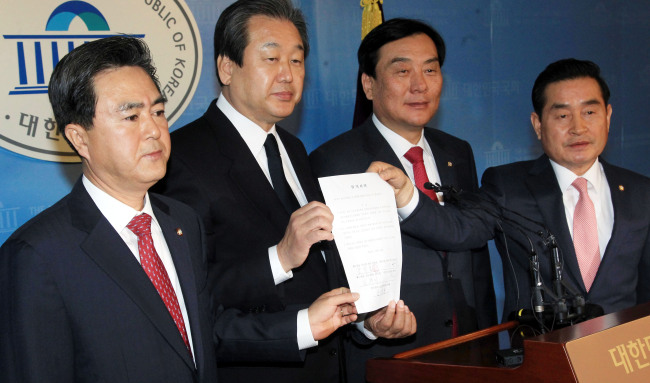
Despite a dramatic end to the strike, a difficult set of tasks is ahead before differences are resolved over the state-run railway operator’s spin-off plan and the damage from the longest-ever train workers’ walkout is repaired.
The union of the Korea Railroad Corp. on Monday decided to end its protracted strike after agreeing with political parties to form a parliamentary committee to address the dispute.
The union began the strike on Dec. 9 in opposition to the government’s plan to set up a subsidiary for KORAIL’s new bullet train service departing from Suseo in Gangnam, Seoul. They believe the subsidiary plan would eventually lead to the privatization of the train service and massive layoffs.
The agreement calls for the establishment of a “subcommittee on rail industry development” consisting of the same numbers of lawmakers from the Saenuri and main opposition Democratic parties.
According to the signed paper, the committee can also form an advisory panel, to include officials from KORAIL and experts, to ensure no rail privatization takes place.
But the agreement left room for a fresh round of contention. Even before the panel was launched, differences were already manifested by the two sides.
The opposition party and the union said the goal of the panel should be preventing privatization of the railway service.
But the Saenuri Party and the company wanted the committee to deal with a variety of issues to develop the nation’s railway industry.
“There’s a lot of work we have to do. We’ll sort out what and how the subcommittee will be discussing after both parties choose committee members,” said Democratic Party secretary-general Rep. Park Ki-choon.
Another tricky issue will be ongoing investigations and disciplinary measures against union members and how to mend the worsened relations between the company and the union, which collided head-on during the strike.
Police pushed ahead with the investigation of the union leaders as planned, saying it would deal with key figures including the union head Kim Myung-hwan in strict fairness.
At the height of the strike, KORAIL threatened to expel or dismiss 490 union members from their posts for leading the strike.
Another 25 union leaders were planned to be sent to a disciplinary committee and forced to take legal responsibility. KORAIL also filed a complaint against 198 union members for disrupting train operations.
Courts issued warrants of detainment for 34 unionists while two strike leaders were arrested.
The latest strike is the longest on record and has led to major train service disruptions.
Freight train operations fell to the 30 percent mark and subway and KTX trains stopped on a near-daily basis due to technical problems. About 13 cases of train failure were reported during the first five days of the walkout.
On the seventh day of the strike, an 84-year-old passenger was killed on a subway train that was being run by a substitute worker.
The strike turned into a clash between unionists and the government when police entered the Korean Confederation of Trade Unions’ headquarters in Seoul by force to arrest the union leaders including Kim.
By Suk Gee-hyun (monicasuk@heraldcorp.com)







![[Graphic News] More Koreans say they plan long-distance trips this year](http://res.heraldm.com/phpwas/restmb_idxmake.php?idx=644&simg=/content/image/2024/04/17/20240417050828_0.gif&u=)
![[KH Explains] Hyundai's full hybrid edge to pay off amid slow transition to pure EVs](http://res.heraldm.com/phpwas/restmb_idxmake.php?idx=644&simg=/content/image/2024/04/18/20240418050645_0.jpg&u=20240419100350)





![[From the Scene] Monks, Buddhists hail return of remains of Buddhas](http://res.heraldm.com/phpwas/restmb_idxmake.php?idx=652&simg=/content/image/2024/04/19/20240419050617_0.jpg&u=20240419175937)

![[KH Explains] Hyundai's full hybrid edge to pay off amid slow transition to pure EVs](http://res.heraldm.com/phpwas/restmb_idxmake.php?idx=652&simg=/content/image/2024/04/18/20240418050645_0.jpg&u=20240419100350)

![[Today’s K-pop] Illit drops debut single remix](http://res.heraldm.com/phpwas/restmb_idxmake.php?idx=642&simg=/content/image/2024/04/19/20240419050612_0.jpg&u=)